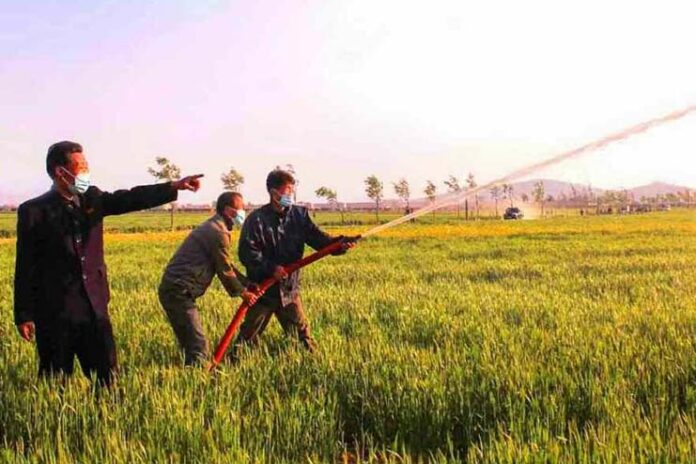
A large number of North Korean farms in South Pyongan Province are reporting that their crops have been damaged by unusual weather this year, including heat spells and heavy rains, Daily NK has learned. That is prompting concerns that this year’s fall harvest will be smaller than normal.
A source in South Pyongan Province told Daily NK on Wednesday that a recent fact-finding investigation of farms by the province’s agricultural management committee learned that unusual weather had caused severe damage in areas with a high concentration of collective farms, including Sukchon County, Pyongwon County, Mundok County and the city of Kaechon.
In addition to an unusually poor harvest of barley and wheat, farmers found potato fields in which the leaves were lush, but the potatoes were rotten, the source said.
After a decent potato harvest, the potato fields should look like plowed fields of dirt, with no leaves. But in many fields, the source said, farmers didn’t even bother to harvest potatoes stunted by drought, heat waves and heavy rains.
The source said that less than 120kg of potatoes were harvested at the beginning of July from just over a hectare on a farm in Kaechon.
In a good year for potatoes, the typical yield from a hectare of farmland would be 10 tons, or 10,000kg. In other words, this year’s potato harvest has been much leaner than typical years because of the unusual weather.
In a recent inspection of South Pyongan Province, North Korean Premier Kim Tok Hun officially acknowledged the crop damage and stunted growth caused by unusual weather.
“If we’re to faithfully carry out party policy in regard to decisively increasing agricultural yields, we need to aggressively adopt technological methods for managing fertilizer and nutrients and advanced farming methods that can allow us to grow crops that are reliable and resilient from an early stage under the assumption that we’ll face unusual weather on a disastrous scale,” Kim was quoted as saying by Rodong Sinmun on Aug. 6. Kim reportedly made the remarks while reviewing the agricultural situation in South Pyongan Province.
In effect, the North Korean government has acknowledged that its crops have either been stunted or spoiled by a series of inclement weather patterns — heavy rain in March, an early heat wave, and monsoon rain bringing over 100mm of precipitation per day since June.
Heavy rain is expected to continue in August and September, which would impact rice cultivation as well. The problem is that those two months are a crucial period for rice formation. If large numbers of North Korean farms suffer flood damage, it would likely cause a huge drop in the cereal harvest this fall.
“August is when the rice flowers bloom and the seeds form. Heavy rain at this time would keep rice ears from growing. Unless the authorities take appropriate measures toward heavy rain, it’s bound to lead to smaller crop yields this fall,” said Cho Chung-hee, director of Good Farmers and an expert on North Korean agriculture.

















